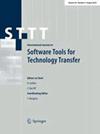用X-KLAIM协调和编程多个ros机器人
IF 1.4
3区 计算机科学
Q4 COMPUTER SCIENCE, SOFTWARE ENGINEERING
International Journal on Software Tools for Technology Transfer
Pub Date : 2023-11-02
DOI:10.1007/s10009-023-00727-w
引用次数: 2
摘要
机器人应用的软件开发仍然是一个主要的挑战,当考虑到多机器人系统(MRSs)时,它变得更加复杂。这种分布式软件必须以良好协调的方式执行多个协作任务,以避免出现令人不满意的行为。本文提供了一种使用编程语言X-Klaim在高抽象层次上对mrs进行编程的方法。X-Klaim的计算和通信模型基于多个分布式元组空间,允许与MRS的内部和机器人间交互的相同抽象和机制进行协调。这允许开发人员专注于MRS行为,实现可读、可重用和可维护的代码。所提出的方法可以通过集成X-Klaim和流行的机器人框架ROS在实践中使用。我们通过以下方式证明了我们方法的可行性和有效性:(i)展示了它在实现两个仓库场景时如何扩展,允许我们在从更简单的场景传递到更丰富的场景时重用大部分代码;(ii)展示了一些实验的结果,表明我们的代码引入了略大但可接受的延迟,并且比基于Python代码的传统ROS实现消耗更少的内存。本文章由计算机程序翻译,如有差异,请以英文原文为准。
Coordinating and programming multiple ROS-based robots with X-KLAIM
Abstract Software development for robotics applications is still a major challenge that becomes even more complex when considering multi-robot systems (MRSs). Such distributed software has to perform multiple cooperating tasks in a well-coordinated manner to avoid unsatisfactory emerging behavior. This paper provides an approach for programming MRSs at a high abstraction level using the programming language X-Klaim . The computation and communication model of X-Klaim , based on multiple distributed tuple spaces, permits coordinating with the same abstractions and mechanisms both intra- and inter-robot interactions of an MRS. This allows developers to focus on MRS behavior, achieving readable, reusable, and maintainable code. The proposed approach can be used in practice by integrating X-Klaim and the popular robotics framework ROS. We demonstrate the feasibility and effectiveness of our approach by (i) showing how it scales when implementing two warehouse scenarios allowing us to reuse most of the code when passing from the simpler to the more enriched scenario and (ii) presenting the results of a few experiments showing that our code introduces a slightly greater but acceptable latency and consumes less memory than the traditional ROS implementation based on Python code.
求助全文
通过发布文献求助,成功后即可免费获取论文全文。
去求助
来源期刊

International Journal on Software Tools for Technology Transfer
Computer Science-Information Systems
CiteScore
4.50
自引率
6.70%
发文量
39
期刊介绍:
The International Journal on Software Tools for Technology Transfer (STTT) provides a forum for the discussion of all aspects of tools supporting the development of computer systems. It offers, above all, a tool-oriented link between academic research and industrial practice.
Tool support for the development of reliable and correct computer-based systems is of growing importance, and a wealth of design methodologies, algorithms, and associated tools have been developed in different areas of computer science. However, each area has its own culture and terminology, preventing researchers from taking advantage of the results obtained by colleagues in other fields. Tool builders are often unaware of the work done by others, and thus unable to apply it. The situation is even more critical when considering the transfer of new technology into industrial practice.
 求助内容:
求助内容: 应助结果提醒方式:
应助结果提醒方式:


